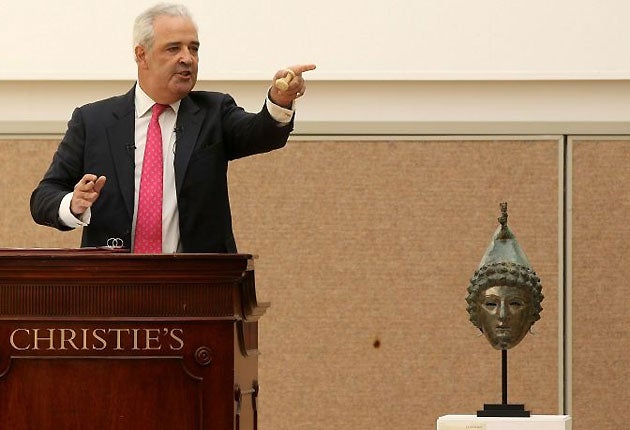Roman helmet found in field sells for £2.3m

Your support helps us to tell the story
From reproductive rights to climate change to Big Tech, The Independent is on the ground when the story is developing. Whether it's investigating the financials of Elon Musk's pro-Trump PAC or producing our latest documentary, 'The A Word', which shines a light on the American women fighting for reproductive rights, we know how important it is to parse out the facts from the messaging.
At such a critical moment in US history, we need reporters on the ground. Your donation allows us to keep sending journalists to speak to both sides of the story.
The Independent is trusted by Americans across the entire political spectrum. And unlike many other quality news outlets, we choose not to lock Americans out of our reporting and analysis with paywalls. We believe quality journalism should be available to everyone, paid for by those who can afford it.
Your support makes all the difference.A Roman helmet unearthed found in a Cumbrian field by a metal detector enthusiast sold for £2.3 million today - almost eight times the estimated price.
But the colossal price caused disappointment for a Carlisle museum which has spent weeks frantically trying to raise funds to ensure the "exceptional" artefact remains in the UK for public display.
The Crosby Garrett Helmet, named after the village near which it was found, sold for £2,281,250 at Christie's South Kensington.
It was bought by an anonymous bidder and it is unclear what will now happen to the bronze discovery, although it will have made its unnamed finder very wealthy.
The buyer may plan to keep it in a private collection or even apply to take it overseas, although such a move could cause the Government to step in and impose an export bar. This would allow time to try to match price and retain it within the UK.
Six bidders were in the running at the London sale, pushing the price steeply from its original £200,000-£300,000 estimate past the £2 million mark.
The helmet - one of only three such items to be found - is almost 2,000 years old and was bought anonymously.
It was found in May 2010 and is thought to date from the late 1st to 2nd century AD. It would have been used for show in a sporting event rather than protection in combat.
The helmet was billed by experts as "an extraordinary example of Roman metalwork at its zenith".
Only two other Roman cavalry parade helmets have been discovered in Britain complete with face masks. The Ribchester Helmet was found in 1796 and is held by the British Museum, while the Newstead Helmet was found around 1905 and is kept at the Museum of Antiquities in Edinburgh.
Georgiana Aitken, head of antiquities at Christie's, London, said: "When the helmet was first brought to Christie's and I saw it first hand, I could scarcely believe my eyes.
"This is an exceptional object - an extraordinary and haunting face from the past - and it has captured the imagination and the enthusiasm of everyone who has come to Christie's to admire it over the past few weeks."
She said antiquity collectors competed with bidders who were more used to investing in modern art and old masters.
The winning bid, she said, was made by phone.
The finder is from the North East of England and in his 20s. The helmet was not covered by treasure law, which only applies to bronze objects found in hoards.
If it had been covered, the British Museum would have automatically been given an opportunity to acquire it, compensating the finder and landowner.
The mask would originally have had a white-metal, silver-like polished surface, contrasting with the bronze of the cap and sculpted hair design.
Thwarted bidders included Tullie House in Carlisle which has been frantically fundraising in the past few weeks to buy the helmet. It had already secured £1 million from the National Heritage Memorial Fund and a further award from the Art Fund.
The Tullie House museum's appeal also drew donations of more than £50,000 from members of the public and an anonymous benefactor had pledged to match donations from the community.
Representatives said they were "very disappointed" today.
If the winning bidder wants to take the item overseas, they would have to apply for an export licence, at which stage a temporary export bar could be granted. This would allow time for funds to be raised to match the price and retain it for the nation.
Many of those who had worked on the failed Tullie House bid hoped a potential export bar could at least ensure the helmet is not lost entirely.
Stephen Deuchar, director of the Art Fund, said: "It is a great shame that, so close to the mark and with such great public support, Tullie House has been unable to secure the Roman helmet.
"We now hope that the export system will be able to kick into action, allowing the museum another opportunity to acquire this remarkable work."
Join our commenting forum
Join thought-provoking conversations, follow other Independent readers and see their replies
Comments